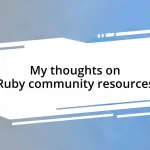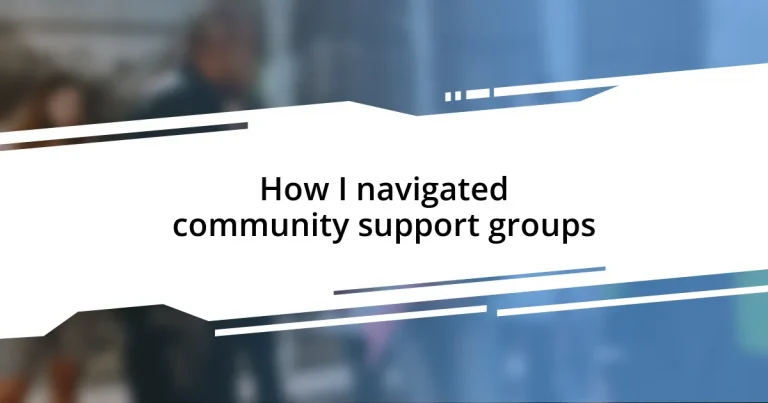Key takeaways:
- Community support groups provide a vital sense of belonging and connection for individuals facing similar challenges.
- Identifying personal needs and goals enhances the effectiveness of participation, allowing for deeper relationships and growth.
- Engaging actively with group members and sharing personal stories builds trust and fosters a supportive environment.
- Giving back to the group, through sharing experiences and encouraging others, creates a cycle of support and collective growth.
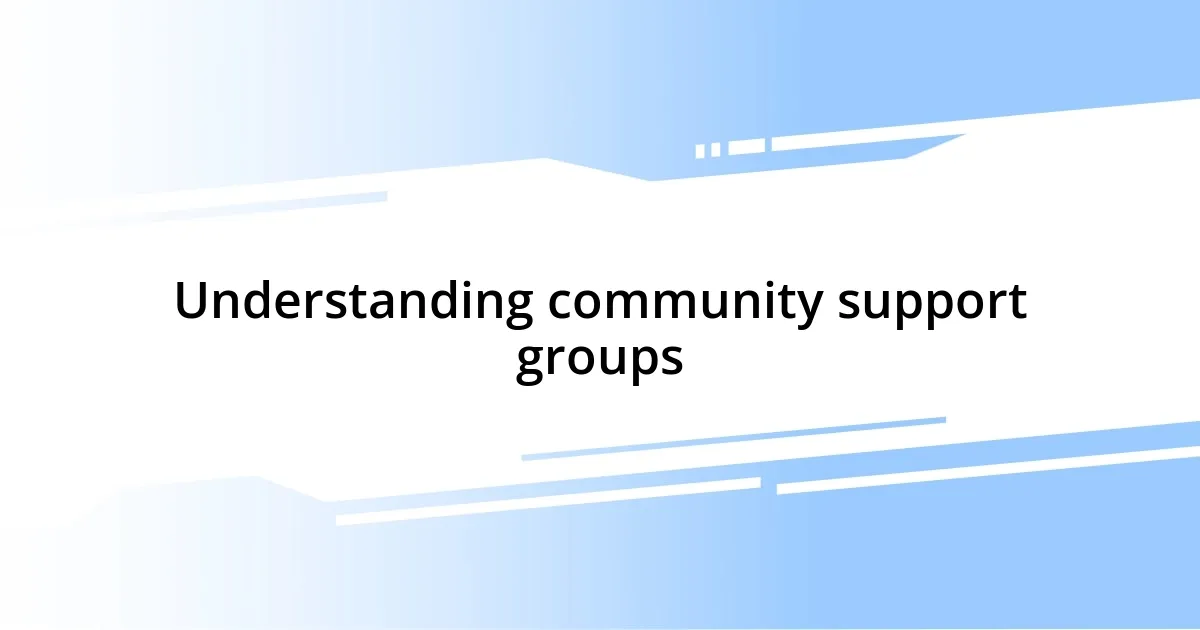
Understanding community support groups
Community support groups serve as a vital lifeline for individuals facing similar challenges or experiences. I remember my first encounter with one of these groups; walking into the room, I felt a mix of anxiety and hope. Seeing others who understood my journey gave me a sense of belonging I didn’t realize I desperately needed. Isn’t that connection powerful?
These groups create a safe space for sharing struggles and triumphs. I’ve often found that just hearing someone else’s story can be a catalyst for healing. It prompts the question: what might we discover about ourselves when we openly listen and share? For me, each session felt like peeling back layers, revealing not just pain but resilience and growth.
Moreover, community support groups foster a collective strength that can be remarkably uplifting. I vividly recall a member sharing their breakthrough moment, and the joy that filled the room was infectious. It made me reflect on how we often underestimate the power of community—after all, aren’t we stronger together? These groups transform loneliness into camaraderie, offering the encouragement we all need to navigate life’s challenges.
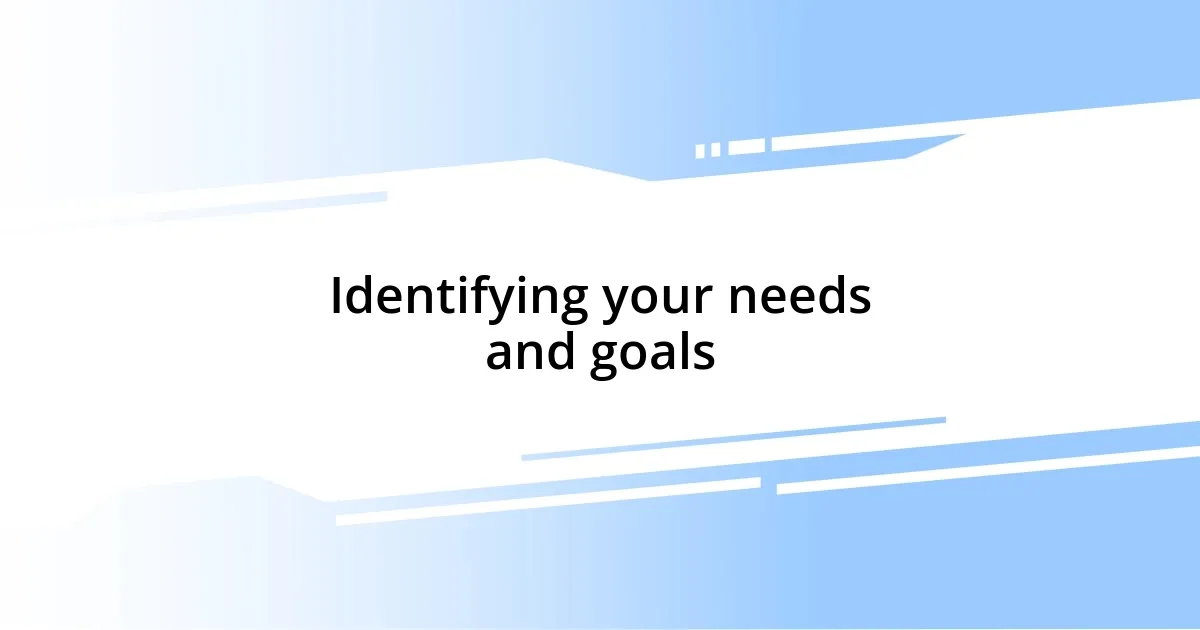
Identifying your needs and goals
Identifying your needs and goals is a crucial first step when diving into community support groups. I learned that taking a moment to reflect on what I truly needed was transformative. I remember sitting in my favorite café, jotting down my thoughts, and I realized that my primary need was connection—not just surface-level chats, but deep, meaningful conversations about struggles I had been going through.
As I started to outline my goals, I discovered the importance of specificity. Instead of just wanting support, I aimed for understanding, shared experiences, and even advice on navigating my circumstances. During a group meeting, I expressed this goal, and it not only clarified my intentions but opened doors to connections I hadn’t anticipated. Can you imagine how liberating it felt to voice that desire and hear others resonate with it?
Lastly, it’s essential to be flexible with your goals. Over time, I found that my needs shifted as I engaged with the group. Initially, I sought emotional reassurance, but as I grew more comfortable, my focus expanded to include personal growth and even helping others. This evolution is natural and reflects the dynamic nature of both individual journeys and community support. Embracing this adaptability laid the foundation for richer experiences within the group.
| Need | Goal |
|---|---|
| Connection | Deep meaningful conversations |
| Understanding | Shared experiences and advice |
| Emotional reassurance | Personal growth and helping others |
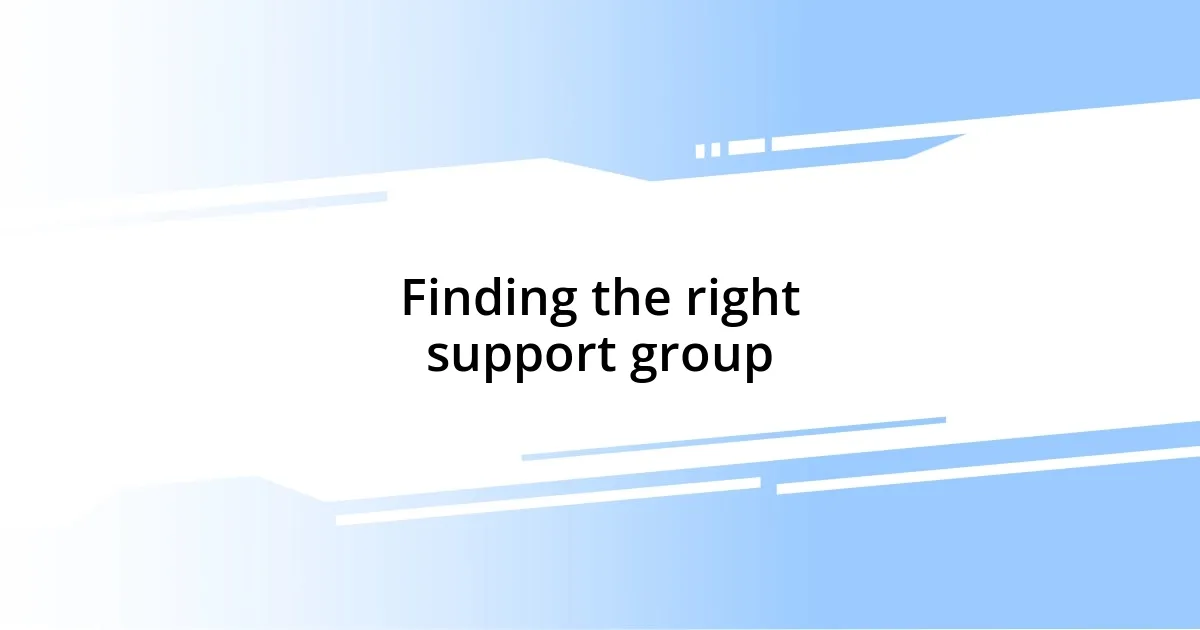
Finding the right support group
Finding the right support group can feel daunting, especially when you’re unsure about what to expect. I recall spending nights scrolling through listings, feeling overwhelmed yet hopeful. It helped me to focus on what kind of atmosphere I was most comfortable in—was it a large gathering or a more intimate setting? Some groups offer a more structured approach, while others are relaxed and informal. Considering these factors really shaped my experience.
Here’s a quick checklist I used to gauge if a group was the right fit for me:
- Atmosphere: Is it welcoming and respectful?
- Focus Area: Does it align with my specific challenges?
- Meeting Frequency: Can I realistically attend?
- Group Size: Do I prefer more intimacy or a larger support network?
- Diversity: Are there varied perspectives that encourage richer discussions?
After narrowing down my options, I remember my first meeting vividly. I sat quietly, absorbing the energy of the room, and felt an instant connection with some members. It became clear that matching your personal comfort with the group’s vibe is invaluable in finding the right place to share your journey.
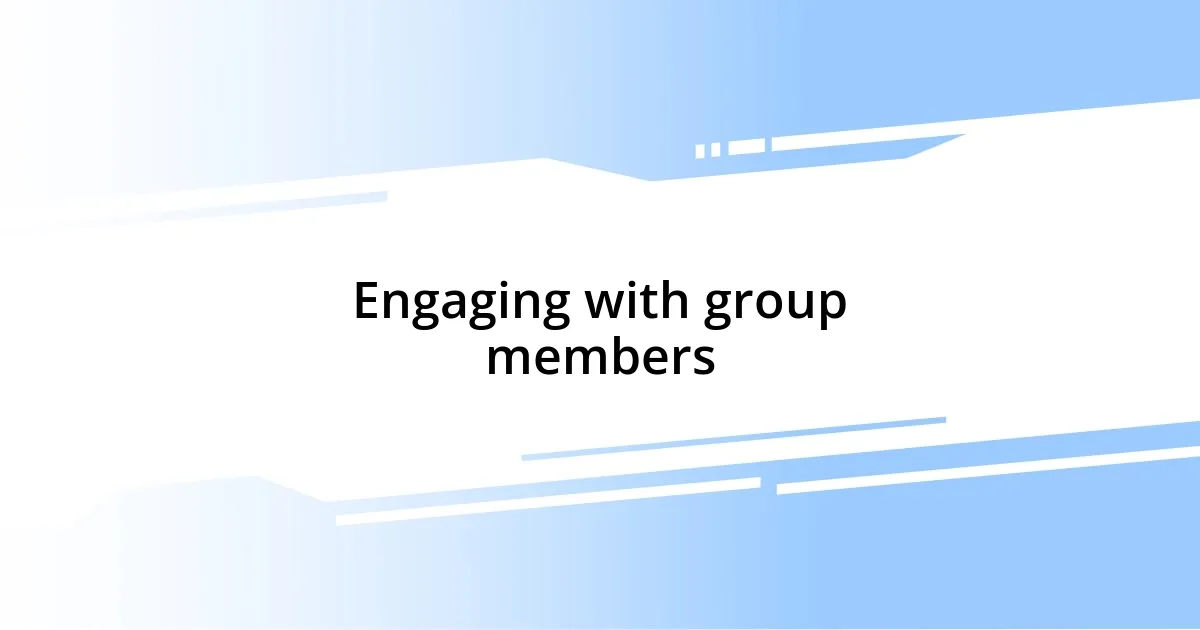
Engaging with group members
Connecting with group members can sometimes feel like stepping onto a tightrope—balancing vulnerability with the desire for genuine interaction. I vividly recall my first few meetings when I hesitated to share my story. After a particularly emotional session, I took a deep breath and shared a moment of struggle that had haunted me. I could see heads nodding in understanding, and it struck me—this is what makes these groups powerful. Isn’t it amazing how our stories can forge instant bonds?
To truly engage with others, I learned to listen actively, connecting with their narratives. I remember one member sharing a breeding ground for deep-seated insecurities, and I felt a flood of empathy. Rather than just waiting my turn to speak, I responded with thoughts that mirrored their feelings. Have you ever noticed how a simple acknowledgment can brighten someone’s day? It felt like planting seeds of trust—my small gestures encouraged others to open up too.
As I became more comfortable, I also made it a point to check in with members outside of group sessions. A quick message or a coffee date allowed for deeper discussions and stronger connections. I’d often reflect on how much richer our interactions became when we stepped outside the structured environment. Don’t you think that those personal connections can turn casual group interactions into lifelong friendships? Engaging authentically indeed enriches the group’s experience for everyone involved.
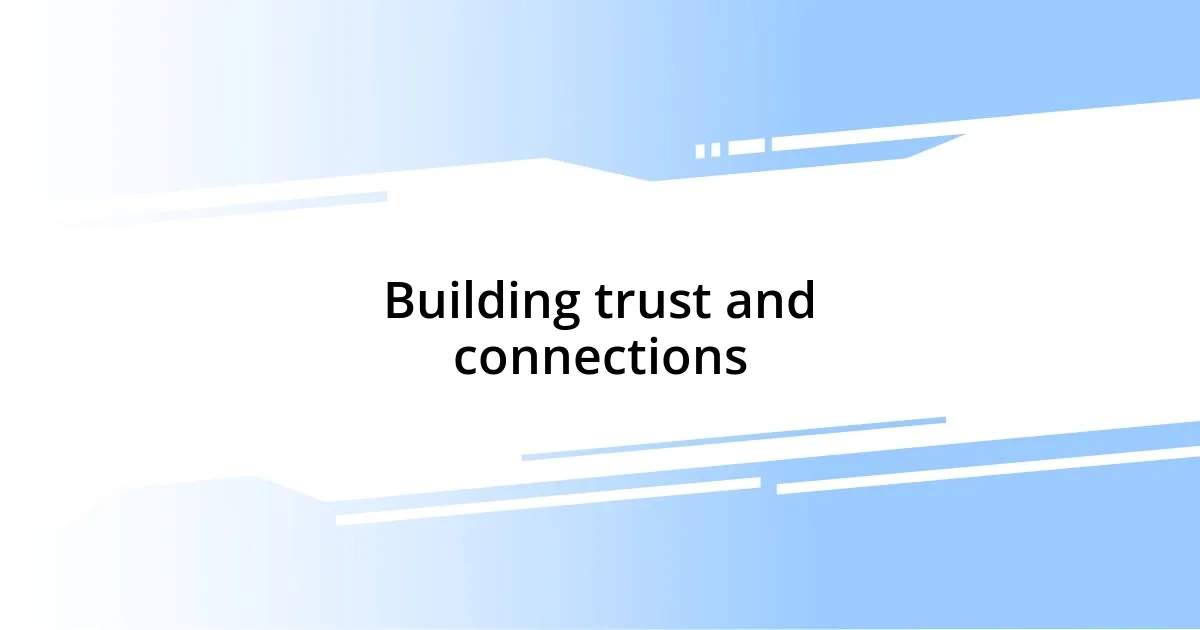
Building trust and connections
Building trust within a community support group doesn’t happen overnight; it’s a gradual process filled with shared experiences. I remember attending a meeting where everyone was encouraged to share their “why” for being there. Listening to others articulate their journeys was enlightening. It felt like peeling back layers of an onion—every story revealed deeper vulnerabilities, and I found a desire to reciprocate. Have you ever felt the weight lift off your shoulders after sharing something you’ve kept bottled up? That moment taught me how openness breeds connection.
As I delved deeper into the group, finding those one-on-one moments became essential. I’ll never forget a time when I had a heart-to-heart conversation over coffee with a fellow member. I shared my fears about moving forward, and her understanding gaze made all the difference. It was in those candid exchanges, outside the structured meetings, that I felt the trust solidifying. Isn’t it fascinating how a simple cup of coffee can shift the dynamics from casual acquaintances to something much more substantial?
Participating in group activities also proved invaluable for building connections. I recall one weekend retreat where we engaged in team-building exercises. It pushed us out of our comfort zones and into shared laughter and challenges. The trust we fostered during those moments transcended the original purpose of the group. Looking back, I realize that those shared experiences didn’t just enhance our relationships; they created a strong, supportive network that I still rely on today. Have you thought about how stepping outside our routine can transform the way we connect with others?
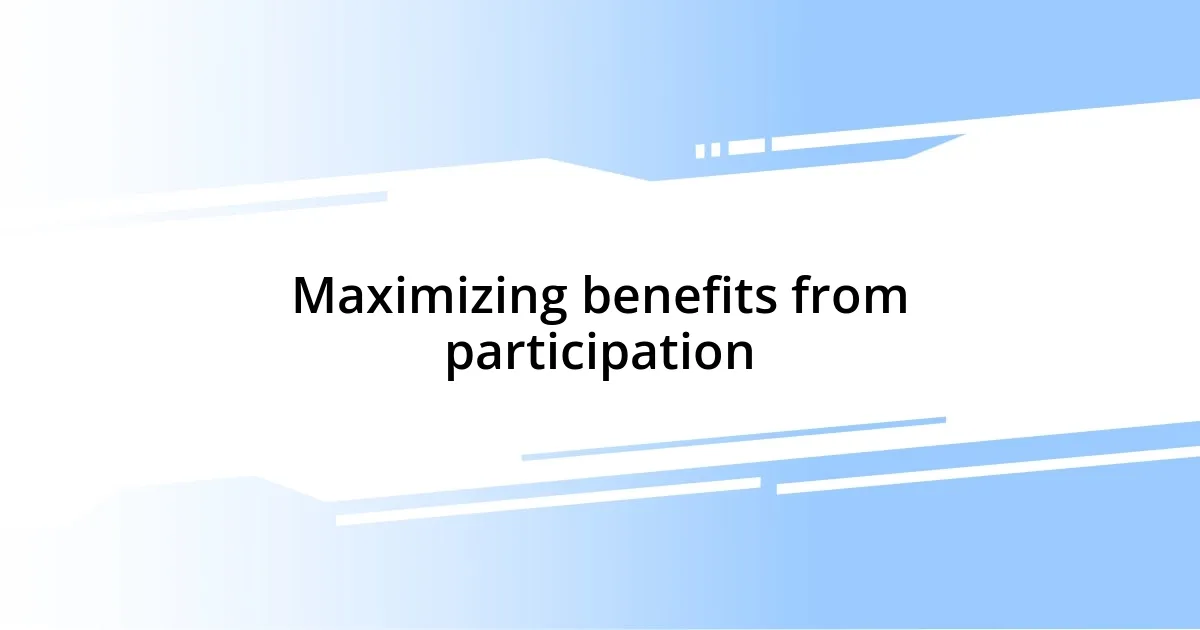
Maximizing benefits from participation
Maximizing the benefits of participating in community support groups is all about active engagement and openness. I remember attending a workshop designed to help us articulate our goals within the group. I took a chance and shared my own—a desire to achieve emotional resilience. The response was overwhelmingly supportive, and I could feel a shift in how others viewed me. Have you ever experienced a moment where being vulnerable opened the floodgates for others to share their aspirations too? It’s remarkable how this simple act can turn a room filled with strangers into a collaborative space.
I also found that setting personal goals for what I wanted to get out of the group was vital. For instance, I aimed to build solid emotional coping strategies. Each meeting became an opportunity to reflect on my progress and seek insights from others. One evening, I shared a particularly tough week and how I coped with those feelings. The feedback I received was invaluable—different perspectives helped shape my understanding, allowing me to approach my struggles more holistically. Isn’t it fascinating how our diverse experiences can intertwine and create a richer learning environment?
Lastly, I discovered that volunteering for group tasks significantly enhanced my experience. Whether it was organizing a social event or leading a discussion, stepping up made me feel more invested in the group. I distinctly remember helping to facilitate a topic that had been close to my heart, and it felt empowering to share my expertise while benefiting from others’ insights. How often do we overlook the power of contribution? This act not only solidified my role within the group, but it also nurtured a sense of belonging and purpose that enriched my entire journey.
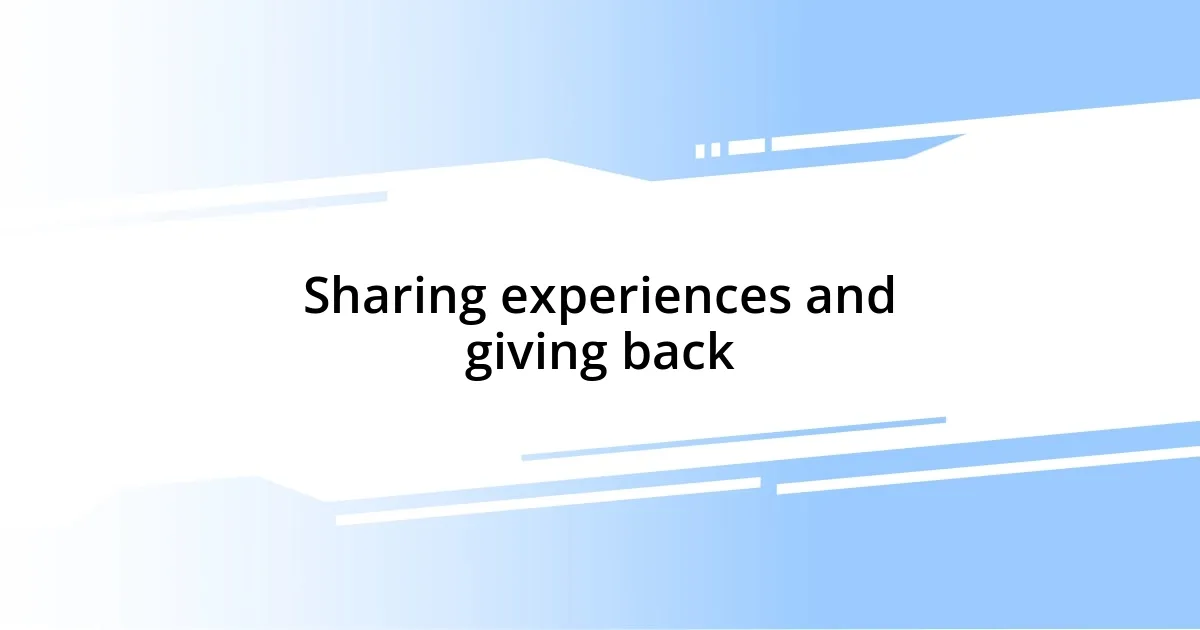
Sharing experiences and giving back
Sharing experiences within a support group has been one of the most transformative elements of my journey. I vividly recall the first time I shared a deeply personal story about my struggles with anxiety. As I spoke, I noticed the room go quiet, almost as if time had paused. In that moment, I felt my vulnerability create an invisible thread connecting me to everyone present. Isn’t it surprising how sharing our challenges often mirrors what others are experiencing? By simply articulating my feelings, I opened the door for others to do the same, and that collective release was both liberating and empowering.
As I became more comfortable with the group, I felt a strong pull to give back. I once organized a small workshop focused on tools for managing stress, driven by my desire to help others navigate their own challenges. Watching participants engage and share their insights was profoundly rewarding and deepened my own understanding. Have you ever had that rush of joy when you realize your experience can help someone else? That’s the beauty of giving back – it creates a cycle of support and growth that benefits everyone involved.
Giving back also means listening and validating the experiences of others. I remember a fellow member who struggled to voice her thoughts during discussions. One day, I gently encouraged her to share a bit of her story, and her face lit up as she spoke about her triumphs and setbacks. In that moment, I understood the incredible power of encouragement. Doesn’t it resonate deeply when someone believes in your voice? This mutual exchange of support not only strengthened our bond but also emphasized the importance of being a source of strength for one another in our healing journeys.




